
Role of Enzymes in Sustainable Industrial Applications
Enzymes are essential proteins that play a crucial role in various industrial applications, particularly in the sustainable development of the industry. From food and beverage production to textiles and detergents, enzymes play a significant role in improving efficiency, reducing waste and pollution, and enhancing product quality. In this article, we will dive into the role of enzymes in sustainable industrial applications and explore their benefits, challenges, and future.
What are Enzymes?
Enzymes, complex proteins, accelerate chemical reactions in living organisms and are responsible for various biological processes, such as digestion, metabolism, and cellular respiration. Enzymes are highly specific and can only catalyze specific reactions, making them valuable tools in industrial applications.
There are various types of enzymes, including hydrolases, oxidoreductases, transferases, and ligases, each with a unique structure and function. Enzymes work by bringing reactants together and lowering the activation energy required for a reaction to occur. This allows reactions to occur more quickly and efficiently, improving the overall yield of the reaction.
Role of Enzymes in Industrial Applications
A crucial role is played by enzymes in various industrial applications, particularly in the food and beverage industry, textiles and detergents, and biofuel production.
To improve the efficiency of processes like brewing beer, making cheese, and producing fruit juices, enzymes are used in the food and beverage industry. For example, enzymes can be used to break down starches into sugars, making them easier to ferment and producing a higher yield.
Enzymes are also used in the textiles and detergents industry to break down stains and dirt. By incorporating enzymes into detergents, the cleaning process is more efficient, resulting in cleaner clothes and a reduction in water usage.
Enzymes are utilized in the biofuel industry to convert plant matter, like corn or sugarcane, into bioethanol. The use of enzymes in this process greatly improves the efficiency and yields of biofuel production, reducing waste and pollution.
Advantages of Using Enzymes in Industrial Applications
Increased efficiency, cost-effectiveness, reduced waste and pollution, and improved product quality are among the benefits of using enzymes in industrial applications.
The most significant benefit of using enzymes in industrial applications is increased efficiency. Enzymes can greatly accelerate chemical reactions, leading to improved yields and faster processing times. This results in a more efficient production process, reducing the time and resources required to produce a product.
Another advantage of using enzymes in industrial applications is the reduction of waste and pollution. The efficiency of processes can be improved by using enzymes, resulting in less waste production and pollution generation, leading to a more sustainable industrial environment.
Furthermore, enzymes are cost-effective since they can reduce the number of raw materials needed to produce a product. Significant cost savings can be achieved by companies, making it a more attractive option in the long run.
The quality of the final product can be improved through the use of enzymes in industrial applications. Enzymes improve the quality of food and beverage products by regulating their texture, flavor, and color, making them more appealing to consumers.
Challenges in Using Enzymes in Industrial Applications
While there are several benefits to using enzymes in industrial applications, there are also several challenges that must be overcome. These include stability, cost of production, and a lack of awareness.
One of the biggest challenges in using enzymes in industrial applications is stability. Changes in temperature, pH, and other environmental factors can greatly impact the activity and effectiveness of enzymes, as they are sensitive to such variations. This can make it difficult to ensure consistent results and can lead to a reduction in the stability of the enzyme over time.
The cost of producing enzymes can also be a challenge, as the production process can be complex and expensive. Smaller companies may face a barrier to entry due to the cost of enzymes, making it challenging for them to compete in the market.
Moreover, enzyme technology suffers from a lack of investment and a slow adoption rate due to a lack of awareness about the potential benefits of using enzymes in industrial applications. This can hinder the growth and development of the industry.
The Future of Enzymes in Sustainable Industrial Applications
Despite the challenges, the future of enzymes in sustainable industrial applications is bright. There is a growing interest in the development of new enzymes and advancements in enzyme technology, which is driving growth in the industry.
Enzymes are expected to play a more significant role in green chemistry in the future, leading to a more sustainable industrial environment that is more environmentally friendly. With the growing demand for sustainable products and the increasing importance of reducing waste and pollution, enzymes will play a crucial role in shaping the future of the industrial world.
Conclusion
In conclusion, enzymes play a crucial role in sustainable industrial applications, from food and beverage production to textiles and detergents, and biofuel production. The use of enzymes offers several benefits, including increased efficiency, reduced waste and pollution, cost-effectiveness, and improved product quality. While there are challenges to using enzymes, the future of enzymes in sustainable industrial applications is bright, with advancements in enzyme technology and growing interest in green chemistry.
FAQs
What is the role of enzymes in industrial applications?
Enzymes play a crucial role in various industrial applications, improving the efficiency of processes, reducing waste and pollution, and enhancing product quality. Industries such as food and beverage production, textiles and detergents, and biofuel production make use of enzymes.
What are the challenges in using enzymes in industrial applications?
The challenges of using enzymes in industrial applications include stability, cost of production, and a lack of awareness.
What is the future of enzymes in sustainable industrial applications?
The future of enzymes in sustainable industrial applications is bright, with advancements in enzyme technology and a growing interest in green chemistry. The integration of enzymes in sustainable industrial practices will play a crucial role in shaping the future of the industry.
ALPHA AMYLASE FOR LIQUEFACTION
This high temperature Alpha Amylase convert Starch into Dextrin.

Reduces
Viscosity

Dextrins
Generation

Free Sugar
Generation
BETA AMYLASE
Our Beta Amylase can be used for the production of Maltose Syrup.

Maltose
Generation

De-branchng Of
Dextrins

Reduces Viscosity
GLUCO AMYLASE FOR SACCHARIFICATION
Our Gluco Amylase is useful for converting Dextrin into Glucose.

High Glucose Syrup

Pullanase Activity

Thermal And Ph Stability
What are Starch Processing Enzymes and Their Key Functions?
Introduction to Starch Processing Enzymes Starch processing enzymes are specialized proteins that facilitate the breakdown of starch, a complex carbohydrate, into simpler sugars. These enzymes play a pivotal role in various industrial applications, transforming starch...
Application of Enzymes in Starch Processing
Enzymes are biological molecules that are essential for various metabolic processes in living organisms. Various industrial processes such as food processing, pharmaceuticals, and textiles also utilize enzymes. Enzymes play a crucial role in the field of starch...

Role of Enzymes in Sustainable Industrial Applications
Starch is the essential raw material used in liquid sugar production. Liquid sugar, also called glucose syrup, is a condensed solution gained from starch by enzyme hydrolysis.
The enzymatic procedure to hydrolyse starch is a more effective and simple process than acid hydrolysis. The process is basically divided into two phases – liquefaction and saccharification.
Liquefaction: An Overview
The liquefaction process includes the gelatinisation of the starch and its treatment with alpha-amylase (𝛂-amylase). The 𝛂-amylase breaks down the starch into even-sized chains, resulting in maltose, dextrin, malt-pentose, and malt-triose. This process is followed by saccharification, the second stage of enzymatic hydrolysis of starch.
Effect of liquefaction time and enzyme addition on liquid sugar production
Glucose production will be greater if there is a longer hydrolysis process. The process can be prolonged with longer liquefaction, resulting in increased glucose content. With a longer liquefaction time, higher glucose content can be obtained since it helps in better fragmentation of starch into glucose. However, an excessively long liquefaction process and enzyme addition can have an adverse effect. It may happen due to a specific activity of α-amylase.
During enzyme hydrolysis, it is essential to run the liquefaction effectively with the right timing; otherwise, the desired result wouldn’t be gained. The effectiveness of the liquefaction process can be ensured by proper conditions for processing and adding the right amount of enzymes.
Types Of Enzymes Used In Starch Liquefaction Process
Different enzymes can optimise the starch liquefaction process in terms of quality, cost, and efficiency of the process, considering a range of conditions. The following are the widely used enzymes in the starch liquefaction process;
Alpha-amylases
Alpha-amylase breaks down the starch under the right circumstances, initiates the liquefaction process and converts starch into liquid sugar. It is an enzyme that initiates the degradation of starch molecules and hydrolysis of starch to break it into small chains. Nearly all living organisms widely produce this enzyme. These enzymes have applications in various food-related industries, and the liquefaction of sugar is a primary one among them. Apart from that, they are used during baking as an antistaling agent in bread.
Where To Get Enzymes For Liquefaction?
Starch liquefaction is a process utilised by numerous industries like food, beverages and pharmaceuticals; therefore, liquefaction enzymes have numerous applications in these industries. If you are operating an industrial unit and need enzymes for liquefaction but don’t know where to get them, Infinita Biotech is the solution. We are one of India’s leading biotech firms known for our assorted range of industrial enzymes and solutions. The array of solutions and products offered by us deliver numerous benefits that conventional chemicals and processes can not provide. With products and solutions provided by Infinita Biotech, industrial units can have the benefits like optimum quality, reduced production cost, minimal wastage and lower consumption of energy.
0 Comments
Submit a Comment
You must be logged in to post a comment.
ALPHA AMYLASE FOR LIQUEFACTION
This high temperature Alpha Amylase convert Starch into Dextrin.

Reduces Viscosity

Dextrins Generation

Free Sugar Generation
BETA AMYLASE
Our Beta Amylase can be used for the production of Maltose Syrup.

Maltose Generation

De-branchng Of Dextrins

Reduces Viscosity
GLUCO AMYLASE FOR SACCHARIFICATION
Our Gluco Amylase is useful for converting Dextrin into Glucose.

High Glucose Syrup

Pullanase Activity

Thermal And Ph Stability
What are Starch Processing Enzymes and Their Key Functions?
Introduction to Starch Processing Enzymes Starch processing enzymes are specialized proteins that facilitate the breakdown of starch, a complex carbohydrate, into simpler sugars. These enzymes play a pivotal role in various industrial applications, transforming starch...
Application of Enzymes in Starch Processing
Enzymes are biological molecules that are essential for various metabolic processes in living organisms. Various industrial processes such as food processing, pharmaceuticals, and textiles also utilize enzymes. Enzymes play a crucial role in the field of starch...
Introduction to Enzymes for Grain and Starch Processing
Enzymes play a critical role in the grain and starch processing industry. They are biological catalysts that speed up chemical reactions and allow for the production of high-quality products with increased efficiency and lower costs. In this article, we will explore...




0 Comments